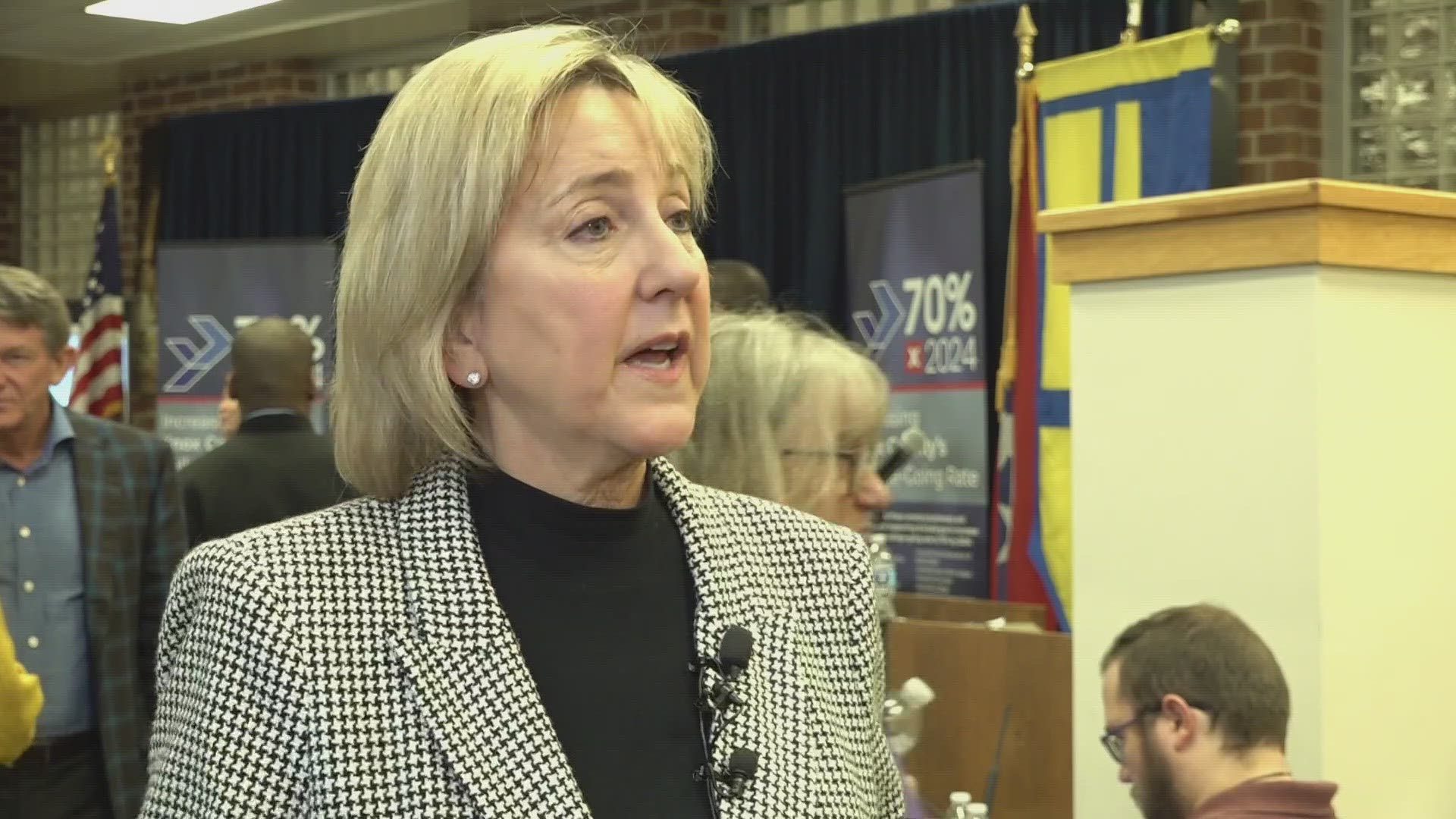KNOXVILLE, Tenn. — The University of Tennessee chancellor ripped the NCAA president in a scathing letter released Tuesday that said the “failing” organization is pursuing “factually untrue and procedurally flawed” allegations that the school violated rules overseeing name, image and likeness compensation to athletes.
Chancellor Donde Plowman wrote a letter to Charlie Baker on Monday shortly after Tennessee officials met with NCAA representatives to discuss the allegations. She said leaders of collegiate sports owe it to students and their families to act in their best interest with clear rules — and that the NCAA is nowhere close to providing that.
“Instead, 2 1/2 years of vague and contradictory NCAA memos, emails and ‘guidance’ about name, image and likeness (NIL) has created extraordinary chaos that student-athletes and institutions are struggling to navigate,” Plowman wrote. “In short, the NCAA is failing.”
Plowman wrote that she appreciated NCAA staff listening to Tennessee's arguments and agreeing to evaluate them. But she also called it “intellectually dishonest” for NCAA enforcement staff to pursue infractions cases as if students have no NIL rights or institutions are “willfully violating” a “clear and unchanging set of rules."
The NCAA's policy is to refrain from commenting publicly about current, pending or potential investigations, with rare exceptions.
While the NCAA lifted its ban on athletes profiting from their fame in 2021, the association still had in place an interim NIL policy that fell back on previous broad rules against using payments as recruiting inducements, pay-for-play and boosters being involved in recruiting of athletes. The NCAA issued several clarifications of the policy and guidance to members over the next 18 months, including identifying third-party entities promoting a school's athletic department as boosters.
The booster-funded NIL collective that supports Tennessee athletes, the Volunteer Club founded by Spyre Sports Group, was among the first and most well-organized to emerge around the country after the NCAA lifted its ban on athletes making money off their fame. That included a deal with prized 2023 quarterback recruit Nico Iamaleava from California.
Spyre defended the 2022 deal with Iamaleava in a statement Tuesday night, noting the quarterback's decision did not hinge on the university he attended and was independent of anyone associated with Tennessee. The group said it followed California law allowing potential college athletes to agree to such deals.
“In short, the agreement was fully consistent with then existing NCAA NIL ‘guidelines’ and had nothing to do with recruiting Nico to the University of Tennessee or any other school,” according to the statement issued by attorney Tom Mars on behalf of Spyre Sports and the Volunteer Club.
The NCAA has been trying to crack down on NIL-related infractions lately, including suspending a Florida State assistant football coach for connecting a potential transfer with a representative of a collective. Tennessee’s Southeastern Conference rival Florida also received a notice of inquiry from the NCAA in June, a little less than a year after an NIL deal gone awry between former blue-chip recruit Jaden Rashada and a collective that was trying work with Gators athletes.
Plowman made it clear she wanted to talk to Baker in person, especially since the NCAA president recently testified before Congress about wanting to meet with as many members and athletes as possible about the issues surrounding college sports. Baker, who previously was the governor of Massachusetts, started in March 2023 and had no prior experience in college sports.
Plowman wrote the letter after her December request for Baker to meet with her and Tennessee athletic director Danny White was denied.
She said Tennessee worked well with the NCAA in a recent investigation, cooperation cited by the Division I Committee on Infractions as the standard for others to follow. Plowman wrote: “When we are wrong at the University of Tennessee, we admit it."
Tennessee could be in danger of being treated as a repeat violator by the NCAA, which could make any sanctions or penalties more severe. Schools are subject to being deemed repeat violators if a Level I and II violation occurs within five years of a penalty being enacted from a previous case.
The NCAA fined Tennessee more than $8 million last July to cap an investigation started by the university in November 2020. The NCAA needed more than 80 pages in its report outlining more than 200 infractions during the three-year tenure of former football coach Jeremy Pruitt.
Tennessee was found guilty of committing 18 Level I violations, the most severe. Most involved recruiting infractions and direct payments to athletes and their families with benefits totaling approximately $60,000.
The head of the panel ruling on the investigation called the violations “egregious and expansive,” with Tennessee failing to monitor its football program.
Only Tennessee’s early cooperation with the NCAA kept the program from a postseason ban. Four former staffers were given show-cause orders, including one spanning six years for Pruitt, who was fired in January 2021.
“It is inconceivable that our institution’s leadership would be cited as an example of exemplary leadership in July 2023, then as a cautionary example of a lack of institutional control only six months later,” Plowman wrote in the letter.
The NCAA report last year found violations including at least 110 impermissible hotel room nights, 180 impermissible meals, 72 instances of providing impermissible entertainment or other benefits, 41 impermissible recruiting contacts, 37 instances of providing impermissible game-day parking and 14 times in which gear was impermissibly provided to prospects.
Tennessee just wrapped up a third season with coach Josh Heupel going 9-4. Iamaleava made his first career start in a 35-0 rout of Iowa in the Citrus Bowl on New Year’s Day.

